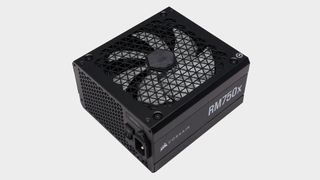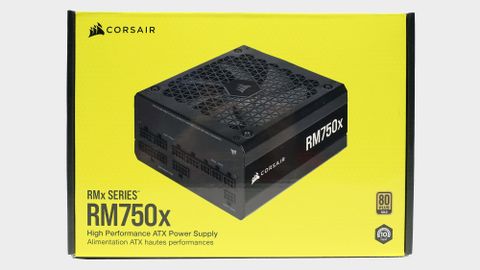Our Verdict
The Corsair RM750x (2021) takes the performance lead over the competition thanks to its excellent platform and top-notch build quality.
For
- High build quality
- Magnetic Bearing Fan
- Ten-year warranty
Against
- Average efficiency could be a bit higher
- In cable caps might bother some
PC Gamer's got your back
The newest version, introduced in 2021, of the Corsair RM750x unit, managed to improve an already outstanding product. Corsair’s RMx line is among the best in the PSU market, combining high performance and reasonable prices, and the RM750x is clear proof of this. The competition is tough, but Corsair’s R&D manager, Jon Gerow (aka famed PSU reviewer Jonnyguru), and his team of engineers manage to create products that set the bar higher and higher.
You simply cannot go wrong with an RMx unit and this is why our pick for the best PSU for gaming in the 750W category is the RM750x.
Specifications





| Manufacturer (OEM) | Channel Well Technology |
| Max. DC Output | 750W |
| Efficiency | 80 PLUS Gold, Cybenetics Gold (87-89%) |
| Noise | Cybenetics A- (25-30 dB[A]) |
| Modular | Yes (fully) |
| Intel C6/C7 Power State Support | Yes |
| Operating Temperature (Continuous Full Load) | 0 - 50°C |
| Protections | OVP, UVP, OPP, OCP, OTP, SCP, surge |
| No Load Operation | No |
| Cooling | 140mm Magnetic Levitation Fan (NR140ML) |
| Semi-Passive Operation | Yes |
| Dimensions (W x H x D) | 150 x 85 x 160mm |
| Weight | 1.64 kg (3.62 lb) |
| Form Factor | ATX12V v2.53, EPS 2.92 |
| Warranty | 10 Years |
| Price | $140 |
The new Corsair RMx (2021) line consists of five models with capacities ranging from 550W to 1000W, and the main differences with the previous models are depicted below.
- Magnetic levitation fan for an increased lifetime under high operating temperatures
- Modern standby compatibility for fast wake from sleep times
- High efficiency under very light and light loads
- Three EPS connectors with the 1000 W and 850 W units
- Cybenetics and 80 PLUS certifications
The fan upgrade is a highly welcome feature. It boosts reliability, even under harsh conditions where most rifle and fluid dynamic bearing fans would have issues in the long run.
The build quality is also outstanding in this CWT platform, which is only available to Corsair. The caps on both primary and secondary sides are Japanese and the FETs, along with the magnetic levitation fan, won’t have a problem outliving the ten-year warranty.
| Rail | 3.3V | 5V | 12V | 5VSB | -12V |
|---|---|---|---|---|---|
| Max. Power (amps) | 20 | 20 | 62.5 | 3 | 0.3 |
| Max. Power (watts) | 150 | 150 | 750 | 15 | 3.6 |
The 12V rail can deliver up to 750W, while the minor rails are powerful with 150W max combined power.
| Cable | Amount included | In-cable caps |
|---|---|---|
| ATX Connector 20+4 pin | 1 | Yes |
| 4+4 pin EPS12V | 2 | Yes |
| 6+2 pin PCIe | 2 | Yes |
| SATA | 3 | No |
| 4-pin Molex | 1 | No |
| AC Power Cord | 1 | N/A |
With two EPS and four PCIe connectors in two cables, this PSU can handle a powerful gaming system. All cables are long enough, so there won’t be any issues in large chassis. The only problem could be the short distance between the peripheral connectors, especially the 4-pin Molex ones, since the parts requiring these connectors, e.g. case fans, are usually installed far from each other.
Performance





























The 12V rail’s voltage increases at light loads, affecting load regulation. Something similar happens to the other rails. Nonetheless, in real life conditions the load regulation on all rails is much tighter than what is shown in the graphs.
On the other hand, ripple suppression is ground-breaking! The combination of the platform’s design and the in-cable caps bring these outstanding results.
The hold-up time is extra long and the same goes for the power ok signal’s hold-up time, and inrush current is low with both voltage inputs.
This is the first time that we see an ML fan in a PSU and this is great.
Efficiency is at good levels with normal loads and sky-high with light and super-light loads, but the 5VSB rail doesn’t stay behind in efficiency compared to the main PSU’s circuit. Vampire power is low, nonetheless.
There is room for efficiency improvements, especially at higher loads.
The transient response is good on the minor rails, but there is room for improvement at 12V, which is the most important rail.
The OCP triggering points at 12V and OPP are set correctly under hot and cold conditions. There is no need for such high OCP triggering points, though, for the minor rails, especially 3.3V which are only lightly used in today’s systems.
Though when it comes to relative performance, the RM750x (2021) easily takes the lead in this category. It is worth noting this is not a noisy unit, but the difference from the previous model is vast. The ML fan is partially responsible for the increase in noise output.
Final thoughts

This is the first time that we see an ML fan in a PSU and this is great, because these fans are super reliable. Although the output noise has increased compared to the previous model, with the rifle bearing fan, still we fully support Corsair’s decision to proceed with this type of fan. The cooling fan is the crucial part of every PSU, highly affecting its reliability, so it is important to use the best fan possible. If the fan fails, everything else will do within a short period and there is even the danger of a fire hazard, if the over-temperature protection is missing. This is why the cooling fan and the filtering caps are two of the most important parts of a power supply.
More generally, the Corsair RM750x (2021) takes the performance lead over the competition thanks to its excellent platform and top-notch build quality. But if we had to pick an alternative, in case this isn't around your area, it'd be XPG's Core Reactor 750W.
The Corsair RM750x (2021) takes the performance lead over the competition thanks to its excellent platform and top-notch build quality.
